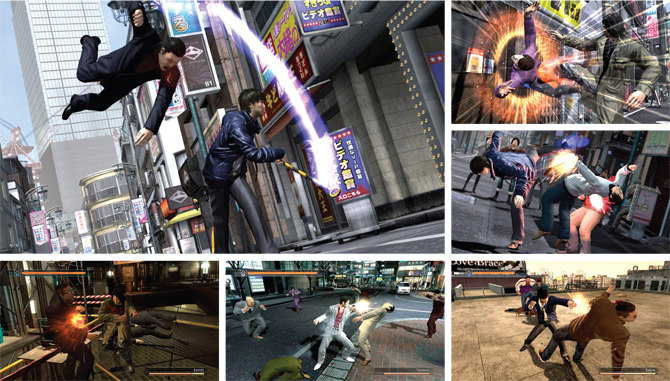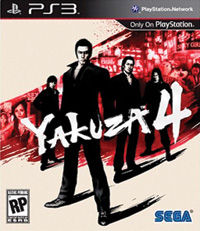

Platform: PlayStation 3
Publisher: Sega Yakuza 4 is the latest installment in a series of video games from Japan about (a somewhat romanticized version of) the Japanese Mafia. Calling the Yakuza series “The Japanese Grand Theft Auto” is misleading on the surface but intriguingly accurate if you delve a little deeper and analyze how it illustrates differences in game design between Japanese and Western developers. Yakuza 4 is about crime stories set in an open city and includes a lot of side quests in addition to the main plot, but the open-city gameplay is restricted to a single district—a fictionalized but highly accurate re-creation of the red-light district in Tokyo’s Shinjuku ward. Unlike GTA there is no driving. Instead you must navigate your way through the dense crowds that pack pedestrian streets. There’s also very little shooting since guns are a rarity in Japan, so fights primarily consist of a lot of brawly martial arts because yakuza are manly fighting men with back and arm tattoos. But yakuza aren’t just hardened thugs—a major theme of the game is their desire to be decent people conflicting with the harsh realities of having a career in organized crime. Over the course of the game you play as four characters. The first one, Shun Akiyama, runs a completely nonprofit loan-shark office as his hobby—he likes to put potential clients through bizarre tests to determine whether they just want free money or if they seriously desire to pull themselves out of financial destitution, learn from past mistakes, and fix their lives. If they pass he gives them interest-free loans. He funds his morality-based loan operation via a hostess club he owns and runs on the sly. When attractive young women ask Shun Akiyama for a loan, he will often test them by saying, “Work at my hostess club for a bit,” because making sure they’re serious means finding whether they’re willing to do things they find degrading. This arrangement is the basis for a minigame in which you train them to be the No. 1 hostess, picking out clothes for them and teaching them to string different types of customers along in different ways and managing their stress levels. So, if you break it down, the subtext here is that you’re playing a pimp who seduces women who are hard up for money to work for you in sexually demeaning capacities. It’s actually presented with a lot of nuance—Shun Akiyama doesn’t seem to encourage the girls to sleep with customers, although he does encourage them to string particularly lucrative patrons along by going on dates with them outside the club. In one instance he seems to give advice to a love-struck customer about how best to seduce a particular hostess—but I have a hard time thinking of the scenario as much more than romantic justification, especially since the game spends so much time romanticizing yakuza activity in general. If it sounds like I’m coming down harshly on the game, I only half mean to. It’s weird, but it’s also fun. The fighting mechanics are pretty solid. The story is cool and the facial animations in the cut scenes are great. And it is genuinely novel—I haven’t played another game that feels like this. I should also mention that the version I’ve been playing is a review build and I haven’t finished the game yet because it’s freakishly long (like Grand Theft Auto VI-style “hundreds of hours of content” long). Now that I’ve completed this review I’ll go back to play it some more and probably even finish it. If you have a PS3, by all means check it out because you won’t find anything else like it. Just, I keep coming back to that subtext.